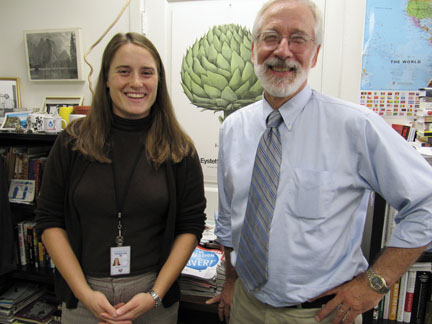Math and Journalism—A Perfect Fit
Meredith Hegg ’00 discovers parallels between journalism and the world of math.

Hegg (left) with Voice of America editor Rob Sivak.
Meredith Hegg had been teaching high school math in Philadelphia and was planning to enter graduate school when she decided to take a slight detour—she applied for and received an American Academy for the Advancement of Science (AAAS) Mass Media Fellowship. The program places science, engineering, and mathematics students as science journalists with news organizations for summer positions. Hegg was placed with the government-funded Voice of America international broadcasting service, where she filed radio and text science news stories.
On paper, this detour into science journalism seems somewhat out of place. Hegg freely admits that she was a complete journalistic novice and that she had always thought of journalism as an “intimidating field.” But at the same time, her ability to communicate well about math and science was important to her, and that made her a perfect fit.
The Mass Media Fellows program is designed for people like Hegg. It is not limited to students with journalistic experience but rather is open to any students who have the basic skills to succeed as science journalists. “A number of the other fellows did have substantial experience,” according to Hegg, “but there was no assumption that you knew anything about journalism.” Hegg discovered that she possessed many of those basic skills as a teacher and mathematician.
“In both journalism and teaching,” she says, “it’s important to step back and look at material with fresh eyes.” An experienced teacher may become numb to the material, she explains. “I think that can happen with reporting too, covering similar topics—even over a few months. You can forget what’s neat and exciting, so you have to stop and step back and try to see it from a different perspective.”
Her math background helped her in her work, too—not just in understanding the subject matter or stories but also in improving the way she crafted them. Highlighting that idea, she even wrote an article for the Society for Industrial and Applied Mathematics Newsletter titled, “Everything I Needed to Know about Being a Reporter I Learned in Math Class.” In it, she talks about how her math skills had parallels in the journalism world. For example, she wrote, “The principles of writing a good [mathematical] proof and writing an effective radio story are surprisingly alike.”
Hegg found her time at Voice of America rewarding for more than just this realization that math skills translated easily to science journalism, though. She was excited by good science and math communication—whether it was the infectious feeling of having a “really great interviewee” who was “articulate and enthusiastic” about the topic, or just being able to delve into a particularly interesting subject.
“I tended to lean a little bit towards environmental stories and some health stories. What I was most eager to do was anything that I thought people weren’t talking about that I thought would be really important,” she says. Keeping in mind Voice of America’s international audience was key in selecting stories—the outlet’s biggest audiences are in Africa and parts of Asia and Latin America.
Hegg’s plans for the future don’t directly include journalism. She is working towards a Ph.D. in applied mathematics at Temple and plans to teach at the college level. However, her statement, “My interest has always been in communicating to people about math and science” holds true.
She originally avoided a mathematics degree at Swarthmore because she saw it as too much of an isolated field (she majored in economics). Although she admits that that view of mathematics has changed, she still holds some criticism for the field—and in that criticism, sees a path for herself.
“To me, it’s unacceptable that there’s this culture [in academic mathematics] that a certain level of misunderstanding is okay, and I think the problem filters down to undergraduate or even high school math classes. There’s this sense that it’s okay not to understand and it’ll work itself out,” she says. “I would really like to change the culture to make the ideas more accessible.”
Changing an entire academic culture is no small task, but Hegg—with her passion for math and science communication—seems up to the job.
 Email This Page
Email This Page